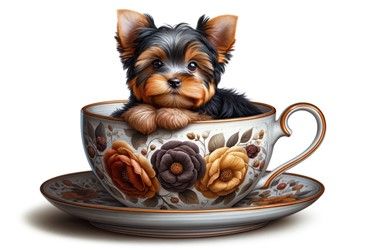About Teacup Yorkies
Overview of Teacups, Mini's and Toys

Why the Term Teacup is Used
A marketing term: Whenever there is something for sale, inevitably those who market it will declare that they have special varieties of it that validate a higher selling price. And, this is exactly what has happened with puppies and dogs. At some point along the way, tiny dogs like the Yorkie, Pomeranian, Chihuahua and others were dubbed 'teacups' to imply that they were special, and much smaller than normal. And the prices of these sought-after pups rose alongside the hype to own one.
In many cases, those 'teacup Yorkshire Terriers' were exactly the same size as expected, which for this breed is a very small 4 to 7 pounds (1.81 to 3.17 kg) in most cases. In other cases, unethical breeders would strive to produce Yorkies that were indeed smaller than expected. And sadly this was done at the expense of the Yorkie's health.
An adjective: Many times, people will use the word teacup as an adjective, simply meaning that a Yorkshire Terrier is small or comparatively little in relation to larger dog breeds. There is nothing inherently wrong with this if it is said innocently and not to mislead anyone.
Understanding Size Standards in Yorkshire Terriers: Debunking the 'Teacup' Myth
The term "teacup" often implies a dog bred to be smaller than the standard size for its breed. However, this concept doesn't apply to Yorkshire Terriers, as the breed lacks a defined minimum size. Historically, the American Kennel Club (AKC) specified that adult Yorkshire Terriers should weigh between 4 and 7 pounds (1.81 to 3.17 kg). The current AKC standard has evolved to omit a minimum weight altogether, only stating that adults should not exceed 7 pounds (3.17 kg). Consequently, breeding Yorkshire Terriers to be smaller than the breed standard is a misnomer since the standard does not establish a lower size limit.
This said, most pet Yorkies are between 4 and 8 pounds (1.81 to 3.63 kg), so an adult Yorkshire Terrier that is under 4 pounds may have certain size-related health issues.
Potential Health Issues with Undersized Yorkshire Terriers
While Yorkies are naturally small dogs, some are bred or naturally occur to be even smaller than the breed standard, particularly those weighing less than 4 pounds as adults. While these ultra-small Yorkies might be appealing for their adorable stature, they often face a range of health issues that pet parents should be aware of. This includes:
1. Hypoglycemia: Hypoglycemia, or low blood sugar, is a common condition in puppies and undersized adults. These dogs have less muscle mass to store glucose and a smaller liver to metabolize it, making them susceptible to sudden drops in blood sugar levels. Signs of hypoglycemia include weakness, lethargy, shaking, and in severe cases, seizures. This can sometimes be treated OTC with sugar water or a nutritional gel.
2. Dental Problems: Smaller Yorkies often have overcrowded teeth due to their reduced jaw size, leading to increased dental issues. These can include periodontal disease, tooth decay, and early tooth loss. Regular dental care is crucial to prevent sometimes serious dental diseases.
3. Fragile Bones: The bone structure in tiny Yorkshire Terriers can be more fragile, making them more prone to fractures and injuries. Even a minor fall or rough handling can result in significant harm, necessitating careful handling and supervision.
4. Respiratory Issues: Smaller Yorkshire Terriers, including those of a significantly reduced size, may be more prone to respiratory problems such as collapsed trachea. This condition can lead to breathing difficulties and chronic coughing.
5. Liver Shunts: Portosystemic shunt (PSS) is a condition more commonly seen in Yorkshire Terriers, and may occur more frequently with those smaller in size. With this, there are shunts where blood bypasses the liver, leading to a buildup of toxins in the body. Symptoms can include stunted growth, gastrointestinal problems, and neurological issues.
6. Difficulty with Diagnosis and Treatment:
The diminutive size of these Yorkies can make diagnosis and treatment of common and rare diseases more challenging. Their small veins make blood draws and IV placements difficult, and they may react differently to medication dosages designed for larger animals.
Preventive Measures and Care for Smaller-than-Average Yorkshire Terriers
Owning a smaller-than-average Yorkshire Terrier comes with a unique set of responsibilities. These tiny canines require dedicated care to ensure they lead healthy, happy lives. By being proactive about their health, pet parents can mitigate many common issues associated with their diminutive size. Here's a detailed guide to preventive measures and care:
#1 Regular Veterinary Check-ups. Regular visits to the vet play a pivotal role in maintaining your Yorkie's health. These check-ups can catch health concerns early, when they're often easier to treat. Schedule annual check-ups, or more frequently as recommended by your vet, especially for screening common conditions in small Yorkies.
#2 Proper Nutrition. A well-balanced diet is essential for preventing hypoglycemia, a common issue in small dogs due to their limited glucose reserves. Look for high-quality, nutrient-rich dog foods specifically formulated for small breeds. Small, frequent meals and snacks given in between meals can help maintain blood sugar levels.
#3 Gentle Handling. Smaller Yorkies have delicate bones, making them susceptible to injuries from falls or rough play. Always support your sweetie's body when picking them up, avoiding pressure on fragile areas. Educate children on gentle play to prevent accidents. Everyone in the house should be very aware that this is an 'under-the-foot' dog that can be easily tripped over or accidentally stepped on.
#4 Dental Hygiene. Tiny Yorkies often face dental issues due to crowded teeth, leading to higher risks of periodontal disease. Incorporate daily brushing with a soft-bristled canine toothbrush and dog-specific toothpaste. Offer daily dental chews as well.
#5 Avoiding Overexertion. Despite their energetic nature, undersized dogs can quickly become overexerted, leading to respiratory distress. Tailor activities to your Yorkie's size and stamina. Opt for shorter, more frequent walks and play sessions that don't add too much physical stress.
#6 Take Note of Cold Intolerance. Ensure your Yorkie has a warm, safe place to rest, away from drafts. It's often best to place a bed or play area away from windows or exterior walls. Note that drafts can come in from outlets as well. Consider placing clothing on your Yorkie, such as a canine vest or jacket, if you outside on chilly days.
Related Articles:
Yorkshire Terrier Appearance - A helpful overview of this breed's general appearance including colors, changes seen with puppies vs adults, summary of tail and ear set and more.
More Articles:
Yorkie Do's and Don'ts - A great list of the most important do's and the most vital don'ts for this adorable toy breed. How many are you following? It's always a great idea to reassess things.
Yorkshire Terrier Care Tips - A great roundup of care tips for all ages, for optimal comfort, health, safety and emotional well-being.
